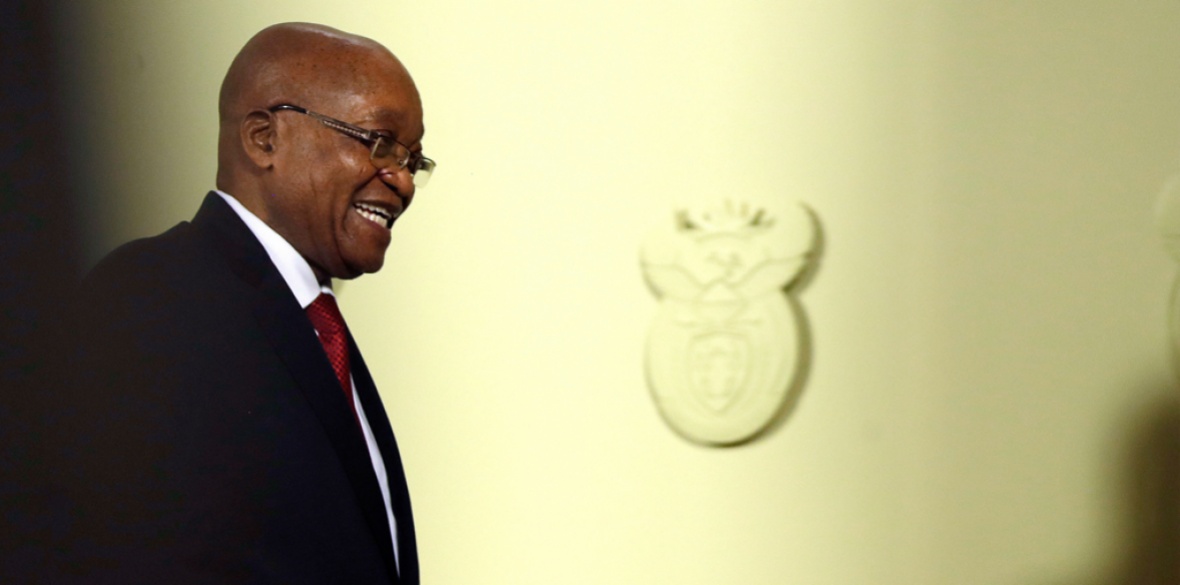This is the last article you can read this month
You can read more article this month
You can read more articles this month
Sorry your limit is up for this month
Reset on:
Please help support the Morning Star by subscribing here
SOUTH Africa’s African National Congress has, in giving Jacob Zuma his marching orders and replacing him with Cyril Ramaphosa, shown a capacity for decisive action that many feared beyond it.
Ramaphosa’s narrow victory over Nkosazana Dlamini-Zuma for the ANC presidency, his supporters’ failure to win a clean sweep of the top six positions and the clear national executive committee knife-edge division into apparently pro and anti-Zuma camps foretold confusion and indecision.
Similarly, Zuma’s initial efforts to string out negotiations over retirement encouraged speculation that he might brazen it out, relying on ANC loyalties to thwart opposition no-confidence motions.
He has rapidly been disabused of such notions, with even erstwhile Zuma supporters acknowledging the need for change and falling in behind the ANC president.
Zuma has had to accept ANC discipline, as his predecessor Thabo Mbeki did previously when the demand for Zuma to take over became deafening.
Mbeki was accused of improper use of state intelligence services in legal proceedings against his then deputy Zuma.
He had also built a high level of criticism within the revolutionary alliance for supporting his health secretary’s nonsensical and deadly recommendation of beetroot and garlic rather than anti-retroviral medication for HIV/Aids patients and for making public attacks on his party’s Communist Party (SACP) allies.
Zuma built an initially close relationship with the SACP, accepting that the identity and role of Communist ministers would be agreed with the SACP leadership rather than solely by presidential decision, as Mbeki had done.
That close relationship has broken down as the SACP moved gradually — some might think too gradually — from supporting Zuma to demanding his resignation or removal by the ANC.
Zuma’s decision last year to sack SACP general secretary Blade Nzimande from his higher education ministerial post sparked renewed demands from the SACP and Cosatu-affiliated trade unions that he should go.
The ex-president’s assertions that he has done nothing wrong, that the ANC failed to itemise concerns over his actions and that he should be allowed to complete his second five-year term while Ramaphosa learns the state presidency ropes and concentrates on winning next year’s elections are breathtaking.
Zuma’s name has become a byword for corruption over public money spent on his Nkandla compound, his relationship with the Gupta family that prompted allegations of state corporate capture and countless charges of bungs paid to him or family members through dodgy business deals.
Beyond the financial skulduggery lurks the memory of a rape charge, for which he was acquitted but over which the stench of betrayal, deceit and recklessness lingers.
ANC campaigning for next year’s general election wouldn’t have got off the ground with Zuma holding on to the presidency. His subsequent corruption trials might well tarnish the party’s efforts in any case.
Ramaphosa’s greatest asset in his new post is that he is not Zuma, but that will not be enough in itself.
The Cosatu trade union movement, which Ramaphosa played a leading role in building, has wasted no time in reiterating demands that his presidency should provide for a developmental state that creates a million new decent jobs a year.
It insists on an end to corporate corruption and privatisation and the sacking of ministers seen as in the pockets of big business.
The future of the ANC in government lies in Ramaphosa’s readiness to involve all sections of the revolutionary alliance and civil society in mapping a route out of greed and division to achieve the goals of the ANC Freedom Charter.










